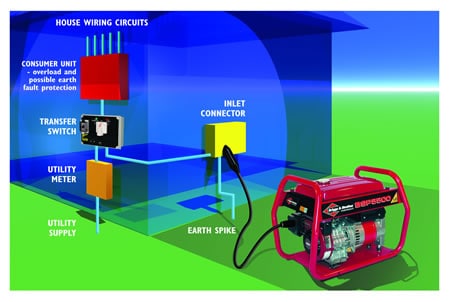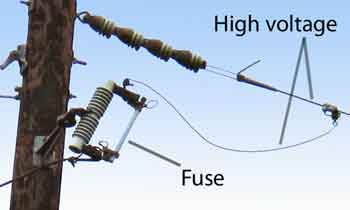I didn't enjoy engineering electronics during college and I've forgotten all, if there was any, of what I might have learned, so;
If the Tesla Home Battery stores 10KWh (the $3,500 model) how many would be necessary to run a house if you lose power? Or, how long would on run an average house?
I have read that at 2kw usage then we get 5 hours (assuming 100% efficiency) but is 2kw a realistic use amount? Is that a fridge and enough power to monitor the heat and fire the furnace for a day or two?
Would it be best to have three units?
Dtp
I'm on the waiting list for one of these. The Tesla site really didn't go into any explanation as to how many one would need to go off grid. Elon Musk is one guy to watch, he is a genius and a money magnet with respect to his inventions and $tock.
Take your electric bill out and see how many kWh you are typically billed for. Divide by 30 days and again by 24 hours. That's your average power usage in kilowatts over the month. That will get you on the road to the ballpark. I got 0.8 kW average usage for my last bill.
But a lot of your usage is intermittent and the battery won't last long enough to average out the peaks and valleys of usage. So I'd estimate the usage while you are awake during a utility outage to be higher than that long-term average - maybe double to put you in the ballpark?
Then multiply the battery capacity kWh by the inverter efficiency (WILD GUESS 80%?) and divide by your kilowatt usage number to get hours. I'd come up with 10 kWh * 80% / (0.8 kW * 2 factor) = 5 hours, but I wouldn't want to bet on it.
I haven't read up on their system, but another consideration would be the peak load (short term) power capacity of the inverter. Do you have a well pump? Heat pump?
The biggest variable in how long a battery charge will last is probably what high-usage appliances you plan to run during the utility outage. Electric stove? Lots of microwave oven usage? I hope no air conditioner or space heater. Don't vacuum the carpet or decide to spend the evening using the power woodworking tools. Use only the essential lights.
Once this battery revolution is in full swing, you will find people using solar for their main power source and grid power for back-up. This may cause the cost of grid power to skyrocket.
This Telsa battery is not small...3'x4'x.6'
I would be concerned about fire hazard personally.
I suspect that in a couple years there will be alternative companies that will be selling batteries at 1/2 the cost per kwh.
foggyidea, post: 348365, member: 155 wrote: I didn't enjoy engineering electronics during college and I've forgotten all, if there was any, of what I might have learned, so;
If the Tesla Home Battery stores 10KWh (the $3,500 model) how many would be necessary to run a house if you lose power? Or, how long would on run an average house?
I have read that at 2kw usage then we get 5 hours (assuming 100% efficiency) but is 2kw a realistic use amount? Is that a fridge and enough power to monitor the heat and fire the furnace for a day or two?
Would it be best to have three units?
Dtp
During tropical storm Irene, we ran our entire household on one of those small 5.5kw generators (I actually found it at the local dump...and found it worked fine). Ran nonstop for three days. We didn't hesitate to run anything we wanted, although we did decide to turn off the jacuzzi until the end; I was curious to know if it would handle it. It did.:-D
But in a typical power failure, you're probably going to act somewhat more judicious about what you're running...fridges, freezers, lights etc.. All that probably isn't more than 2kw, depending on the house. I'd start with figuring out how many and how long the power failures have been in your area, and decide what your tolerance is for losing power for any period of time.
If I were ever thinking about getting one of those, I'd get the smallest there is, and use it as a household UPS. Then once it's on line for an hour or whatever, if it was looking like power wasn't coming back on, I'd fire up a generator (to run the house and re-charge the battery). A brand new unit the size I have (5.5kw) is less than a grand. Not sure I'd buy a battery big enough to try to replace that.
Don:
Kill A Watt is an analysis gizmo that you can use to see what the actual use is for individual appliances or systems.
http://www.amazon.com/s/ref=nb_sb_ss_c_0_7?url=search-alias=aps&field-keywords=kill+a+watt&sprefix=kill+a+,aps,280
Several people in my area are off grid, or in marginal areas.
most use a separate 12v system for lights or small RV style pumps, saves the power loss of running thru an inverter.
there are fancy solar systems that have a unit in the main breaker box, it can be switched/configured to only power select circuits when running off the battery bank. "they say" it is great for when the main power is down.
I would guess your heating system sensor/switch is a very low use item... it maybe even be running on 12v using one of those power supplies like a phone charger. A deep cycle 12v RV/Boat battery would serve that just fine.
The refer... guessing that your power outages are in winter, just keep the door closed more and all should be fine for several days.
We had a power outage during a storm several years ago, it lasted 4 full days. I grabbed a hot 12v car battery from the garage and an inverter, it powered my modem and I had internet (DSL on phone lines was not effected). Candles and flashlights, all was fine. I do have a 10kw diesel generator in the garage that uses less than 1 liter/hour. Too lazy to wire it up.
For emergency uses, a Honda 2000i generator, 4 deep cycle batteries and an inverter will power most things in a small home that uses efficient appliances and lighting.
The Honda 2000i uses very little fuel compared to the Y2K style 5500 watt generators. A cup full of fuel will power your house for hours. Add 4 100 watt solar panels and you have a very effective system that will make you wonder why you are paying your power bill every month.
They make larger generators, but in an emergency do you really have to have everything on at once? Also fuel consumption should be a primary concern if services are to be disrupted for any length of time.
A generator is great for occasional outages of a few hours. It is hard to store enough gasoline to be prepared to run one for long periods. People who really want/need long-term backup have units fueled by natural gas or propane.
This is probably a stupid question, but do you wire the generator into your existing home wiring somehow or do you rig up separate wiring for the generator?
A transfer switch is ABSOLUTELY necessary! Not using one can put line crews at great risk. Without one, the 230 volts generated goes backwards through the transformer on the pole, turning it into deadly 7200 volts (not that 230volts can't be as deadly).
It's my understanding that the Tesla systems, when installed professionally, have the transfer switch built in, to avoid such dangers.
You either run everything off extension cords, or you get a transfer switch installed. There are some relatively inexpensive subpanels that can be added beside your main panel to transfer a few (typically 6) circuits from the utility company power to your own power source.
What you do NOT do, although I've heard of too many instances, is rig a backfeed into some receptacle to feed your house from the generator instead of having a transfer switch. It is too easy to screw up in a power-outage situation and send your generator into the local grid. If only a few houses are isolated by a downed line or such, it may not overload the generator, so you could fry somebody who is working on the "dead" lines.
Edward Reading, post: 348655, member: 132 wrote: This is probably a stupid question, but do you wire the generator into your existing home wiring somehow or do you rig up separate wiring for the generator?
Back in 2000, my grandpa had a 5500 watt generator wired to feed his house during power outages...the house lights were brighter using the generator than when using grid power.
I checked his grid voltage and sure enough it was on the low side of acceptable.
One important thing to remember about electronics, they are sometimes sensitive about voltage. The cheaper generators are not internally regulated, the higher the RPM's, the higher the voltage. I would definitely check the output before running any electronics directly off a generator.
Thanks, that makes sense. We have solar panels and we have to have one of those switches. It's set to flip if the grid goes down. They don't want live wires where their lineman think the power is out. PG&E (reluctantly) takes our solar generated power when the grid is up. We haven't had an electric bill for 8 years.
I'll have to look into one of those generators.
consider all lines Hot, always. I watch our linemen work, they even treat new wire on the spool just like it is Hot. Their habit is to handle wire in the same manner, always.
But, you gotta dumb it down
They often do isolate the line they're working on. But they don't pull fuses from every home's pole transformer on the line. That's where the rogue voltage would be coming from. As a precaution, they'll often ground the line they're working on...that is, put a jumper from the line to ground.
But it's just plain not safe to back feed the line during a power outage. The systems that legally "turn the meter backwards", measure the voltage on both sides of the system, and would shut off in the event of a power failure.
Yes, that is what ours does. I mis-stated it before, I believe that it actually shuts down the inverter when it detects that there is no current on the grid side.
Some places have "net metering", with solar power systems. Not sure about a generator, don't beliive you can generate power less than the power company. With the proper hookup you can push power into the grid. You just pay for the net you use. So what ever power you collect you save the retail cost. I think if you push back more than you use you only get a wholesale cost for it. They probably do it on a monthly basis.
LRDay, post: 348843, member: 571 wrote: They probably do it on a monthly basis.
Pacific Gas & Electric (northern California) bills a minimal ($5 a month or so) amount for electricity until my "trueup" month (June in my case), at which point they bill me for the net difference.





